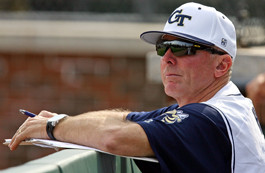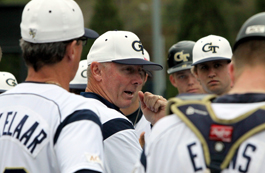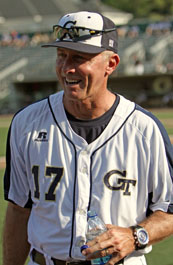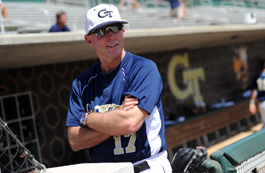Feb.
1, 2012
click here
for CBI ACC preview
click here for ACC preseason coaches' poll
click here for Hall thoughts on former players
Players’ favorite Hall
approaches milestone
By Sean Ryan
CollegeBaseballInsider.com
Co-Founder
sean@collegebaseballinsider.com
@collbaseball
 In
early November of 1993, Jim Morris left the preseason No. 1 team
in the country for Miami, what he called the No. 1 program in
the country. In
early November of 1993, Jim Morris left the preseason No. 1 team
in the country for Miami, what he called the No. 1 program in
the country.
About 700 miles from Atlanta, Kent State coach
Danny Hall (right) had visions of taking over the Georgia Tech
program.
“It’s really interesting, the job opened up at an
unusual time,” Hall said.
He called Ray Tanner, then the head coach at NC
State, asking if he thought there was a front-runner for the
job. He also asked Tanner if he was going to go after the job.
Tanner told Hall there wasn’t a front-runner –
top assistant Rick Jones had just left Tech for the head job at
Tulane – and that he wasn’t interested. He asked Hall: Do you
know who Randy Carroll is?
Carroll, a former Tech All-American, was
influential in helping Morris build the Yellow Jackets into a
national program through fundraising and attracting advertisers.
Tanner told Hall that Carroll was heading the search committee
for athletic director Homer Rice.
“I had a Georgia Tech media guide in my office
for whatever reason,” Hall recalled.
In it, he stumbled across an ad for Mountain
National Bank, led by Randy Carroll. Hall called the bank and
introduced himself to Carroll, who advised him to send a resume
and cover letter to him and Rice. Hall hurriedly sent his life’s
work via Fed Ex and called Carroll back to confirm that he
received his package.
 Hall
remembers Carroll’s response. Hall
remembers Carroll’s response.
“He says, ‘Just about everybody who has applied
for this job, I’ve either seen them play against Georgia Tech or
coach against Georgia Tech. I don’t know a damn thing about
you.’” Hall said.
Carroll, now the executive chairman of the board
and director of business development at Buckhead Investment
Partners in Atlanta, said, “I didn’t know Danny Hall. I’d been
contacted by so many people over a few days. I was pretty
straight forward about it. I guess I was pretty blatant, I hate
to say it now.”
But Carroll and Rice gave Hall a look. They
enlisted former Tech player Cam Bonifay, newly minted general
manager of the Pittsburgh Pirates and a member of the search
committee, to check on Hall among professional scouts. They
checked in with college coaches who had played against Hall’s
Kent State squads. Everywhere they called, the answer came back
the same: He can recruit, and he can coach.
Hall also had a somewhat silent, but important
recommendation. Carroll had talked with Tanner not so much about
the job but what they were looking for. Tanner never mentioned
any names to Carroll, but Hall mentioned it was Tanner who told
him to contact Carroll in the first place.
“I don’t think Ray Tanner would tell just anyone
to call me unless it was a legitimate candidate,” Carroll said.
“That kind of stuck in my mind.”
Nineteen seasons later, Hall has more than made a
name for himself.
Including six seasons at Kent State, Hall is 13
wins short of 1,000 for his career (he or Missouri State’s Keith
Guttin will be the 46th Division I coach to eclipse 1,000). He
ranks in the Top 15 among active D-I coaches in winning
percentage (.679) and is in the Top 20 among active coaches in
wins.
The Yellow Jackets have gone the NCAA Tournament
in 16 of his 18 seasons and reached the College World Series
three times (1994, 2002 and 2006). Over that time, Tech has
averaged 43.3 wins a season – 10th best in the nation.
“I think the thing that makes Coach go so much is
how much he loves trying to improve your game,” said Matt
Wieters, a two-time All-American at Tech and now the starting
catcher for the Baltimore Orioles. “There’s always something
that he would do to make our team better or each individual play
better.
Scott Stricklin, who assisted Hall at Georgia
Tech before taking the Kent State head job, said: “His track
record speaks for itself. It’s consistent year in and year out.
They’re in the mix to get to Omaha every year.”
 After
going 208-117 (.640) over six years and leading Kent State to
two straight NCAA tourneys, Hall inherited a gold mine at Tech.
The Yellow Jackets, featuring future first-round draft picks
Nomar Garciaparra, Jason Varitek and Jay Payton and
second-rounder Brad Rigby, were the preseason No. 1 team in the
country. After
going 208-117 (.640) over six years and leading Kent State to
two straight NCAA tourneys, Hall inherited a gold mine at Tech.
The Yellow Jackets, featuring future first-round draft picks
Nomar Garciaparra, Jason Varitek and Jay Payton and
second-rounder Brad Rigby, were the preseason No. 1 team in the
country.
“You’re excited, I knew that Georgia Tech was
going to be ranked No. 1 in the preseason,” Hall said. “I knew
Coach Morris had built a very good program.”
Yet, here was a coach from a mid-major program
taking over one of the emerging programs in the nation.
“I guess we felt like it would be difficult for
anyone to fill Jim Morris’ shoes,” Carroll said. “Do you say
that’s a risk? I don’t know…Anybody following Jim Morris after
he had such great success would be considered a risk.
“Jim Morris was the right coach to build our
program and its facilities to a competitive level, and Danny
Hall has been able to continue that tradition. Their skills seem
somewhat tailored to what Georgia Tech needed at the time.”
Any concerns that his new players may have had
may have been lessened by Payton. While at Kent State, Hall had
recruited Payton, an all-world centerfielder from Zanesville,
Ohio. He called Payton’s parents when he was going through the
interview process.
According to Hall, Payton visited Homer Rice and
told the athletic director that if all things were equal, he
would have gone to Kent State to play for Hall.
“I almost think that he had told the players
before I got here that this guy’s a good coach and good guy,”
Hall said of Payton.
With all that star power, the Yellow Jackets
reached their first College World Series, ultimately falling to
Oklahoma in the final game.
“It was a case where you give them some structure
and ideas on what was important to win and then stay out of the
way,” Hall said. “Those guys could really play.”
The gold rush was on.
Hall and his staff consistently lured star
recruit after star recruit, players like Mark Teixeira, Micah
Owings and Matt Wieters. Those who may not have been considered
top prospects out of high school developed into high-round draft
picks, like Deck McGuire and Brandon Boggs. In all, 97 Yellow
Jackets have been drafted during Hall’s 18 years, including 12
first-round picks.
And the Yellow Jackets took Morris’ winning
foundation and made it a tradition.
“For me, he was a coach who seemed like he truly
cared about the player,” said Wieters, who added that he’s even
closer with Hall these days. “He wanted to win, wanted to get to
Omaha, wanted to get to the national championship, but he wanted
to make the individual players reach their full potential so
they could pursue it as a career.”
Kyle Wren, a sophomore outfielder for the Yellow
Jackets, remembers how Hall offered him and his brother Colby
scholarships and told them to take their time with their
decision. That relaxed vibe the brothers felt during the
recruiting process has continued as they suit up for Tech.
“The biggest thing for me is that it’s a relaxed
system,” Wren said. “You’re not nervous every time you go to
practice. He kind of lets you feel your own way out. He lets
everyone do their own thing… he really treats it like it’s a
professional atmosphere.”
It’s hard to argue the approach.
Throw in players from Hall’s previous two stops –
as an assistant at Michigan, where he enjoyed four trips to
Omaha, and as the head coach at Kent State – and Hall’s pupils
read like an All-Star lineup. Barry Larkin, Chris Sabo, Jim
Abbott, Hal Morris and Scott Kamieniecki all played for Hall and
head coach Bud Middaugh at Michigan. Hall coached Dustin
Hermanson at Kent State.
 “It’s
very humbling, but very gratifying to watch how successful those
guys have been,” Hall said. “It’s
very humbling, but very gratifying to watch how successful those
guys have been,” Hall said.
Added Stricklin: “Great players have always
played for him, and great players have always developed. He’s
been blessed to be around a lot of those big leaguers, but he’s
the guy who recruited them.”
When Larkin was voted into the Hall of Fame in
January, the former Cincinnati Reds star singled out Hall’s
importance in his development as a player.
“I was very much caught off-guard,” Hall said.
“That’s just the type of guy he is. It says a lot about him for
him to say that. It certainly meant a lot to me. I had a lot
more bounce in my step that day that’s for sure”
As unlikely as it may have been that Hall got the
Georgia Tech job in the first place, it easily could have never
happened.
When Hall was playing baseball and studying
biology/pre-med at Miami (Ohio), he never envisioned becoming a
coach like his father, who coached him in high school. While
playing for Bowling Green coach Don Purvis in the Central
Illinois College summer league after his junior year, Purvis
offered him the chance to be a graduate assistant.
On a road trip to Central Michigan, Middaugh,
then the coach at Miami (Ohio) asked him why he was going to
coach at Bowling Green when he might be able to coach at Miami.
Hall was under the impression that the current graduate
assistant was the only one who would be on staff. Middaugh
lobbied successfully with administrators to add a second
graduate assistant. Hall was in a bind: He had already told
Purvis he would take the job, but his head coach didn’t want to
let him go.
“He proceeds to undress me for about 15 minutes
on why you would think about going to Bowling Green,” Hall said.
“I didn’t make the decision, Bud Middaugh made the decision for
me.”
Hall stayed at Miami (Ohio). When Middaugh was
hired at Michigan, he made Hall, then 24, his full-time
assistant. Eight years with the Wolverines later, Hall was named
head coach at Kent State. And six years after that, he checked
in with a banker in Atlanta about taking over one of the top
programs in America.
“The decision I didn’t make,” Hall said, “was the
best decision I ever made.”
(photos courtesy of Georgia Tech
Media Relations Office)
|